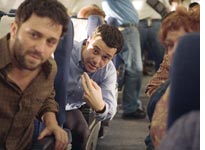I was a bit surprised to see United 93 finish second at the box office this weekend (behind RV - ugh). As I said before, I thought people would generally steer clear of it, thinking it was too soon for this kind of movie or wanting to avoid the subject matter entirely. And to be fair, it's not like moviegoers came out in droves. $11 million isn't a record-setting gross.
(I'd argue that the second-place finish had more to do with the lack of options for adults. If you wanted to go to the movies last weekend, United 93 was probably the only film that looked remotely appealing. But that's another topic.) As you can surely imagine, it was a tough movie to watch. It's not so much that it affected me emotionally (though it was certainly moving). I just had this sense of dread through most of its first half. I basically knew what was going to happen, but the anxiety over waiting to see it was a bit hard to take. At the risk of sounding like I want a blurb on a movie poster, my heart was pounding. It was kind of like watching a horror film.
As you can surely imagine, it was a tough movie to watch. It's not so much that it affected me emotionally (though it was certainly moving). I just had this sense of dread through most of its first half. I basically knew what was going to happen, but the anxiety over waiting to see it was a bit hard to take. At the risk of sounding like I want a blurb on a movie poster, my heart was pounding. It was kind of like watching a horror film.
Having said that, I never felt like United 93 was being exploitive or manipulative. There's nothing here that's designed to toy with your emotions (unlike its TV movie counterpart, Flight 93, which I also masochistically watched this weekend). Paul Greengrass just presents what happened - or what is believed to have happened - and leaves it at that. There's no melodrama. Violence is largely implied. The camera doesn't zoom in tight on Todd Beamer when he says "Let's roll." We don't see people tearfully say goodbye to their loved ones. Everything just blends into the overall story.
I was also impressed that Greengrass didn't try to remind us how terrible a day 9-11 was. We already know that. We were all there. And he knows that. There is very little shown, outside of some news footage, and very little said by the characters. And that blank space allows the viewer to fill in his or her own memories. We can remember where we were, what we were doing, who we spoke to, who we were worried about. I applaud that kind of respect for the audience. It's not shown nearly enough in movies these days.
(I'm not sure such respect was deserved by one of my fellow moviegoers, however. At the moment the passengers decided to attack the hijackers, some jerko at the back of the theater cheered like a touchdown had just been scored. I immediately thought of Susannah's comments here a couple of weeks ago. Look, if the movie compelled him to do that, fine. We all react in different ways, emotionally. But it was so inappropriate. Go home and watch Die Hard again, pal.)
In Slate, Dana Stevens asked what Greengrass was trying to say with this. And that's a really interesting question. But it never occurred to me while watching the film. Besides, what could he have said? (And with that, maybe Stevens is wondering what the point of the whole venture was.) Essentially, this was a dramatized documentary. I think that's exactly what Greengrass intended. And it's just how this material needed to be handled.
Tuesday, May 02, 2006
Exactly what it needed to be
Posted by
Ian C.
at
1:30 PM
![]()
Labels: movies, Paul Greengrass, United 93
Subscribe to:













